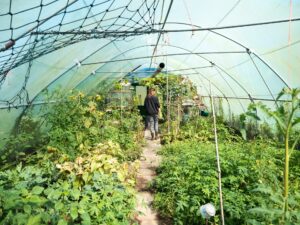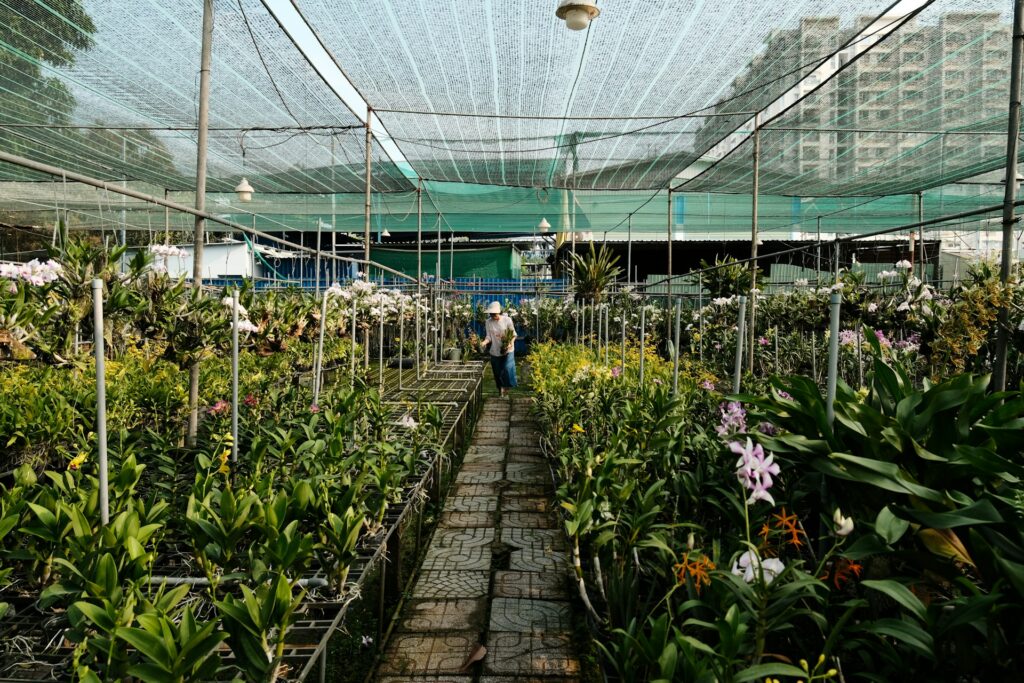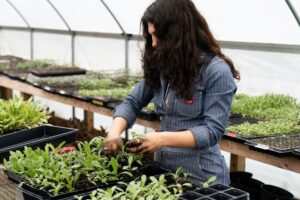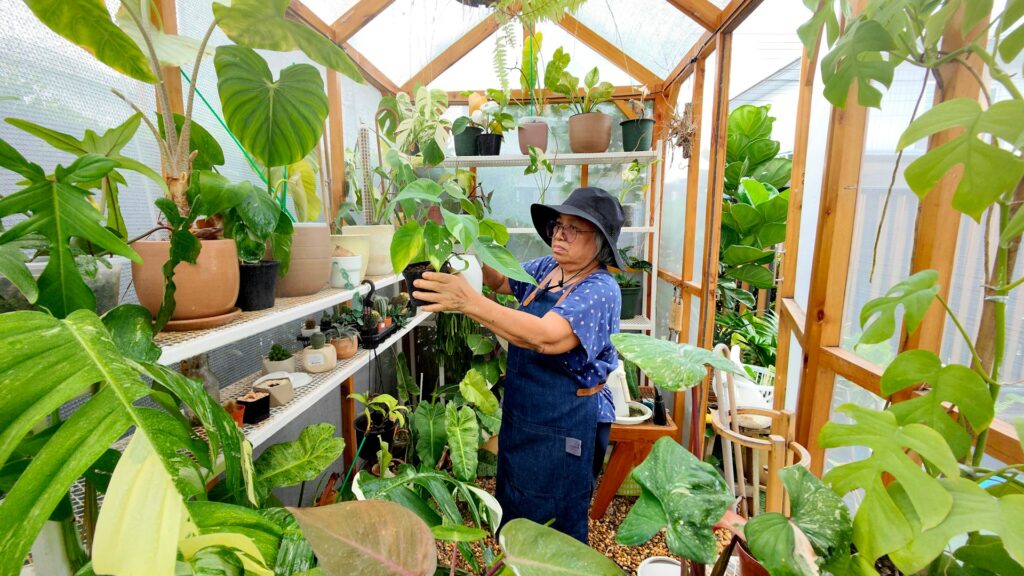 Plant nursery jobs in the USA provide a special fusion of practical labour, environmental responsibility, and a strong bond with the natural world. Nurseries are essential to agriculture and the green sector, whether they are cultivating ornamental plants, propagating trees, or preparing seedlings for farms and landscapes. These positions are perfect for people who love working outside. They are interested in gardening and get a kick out of watching something grow from the ground up. Opportunities for both seasonal workers and experienced horticulturists can be found all over the nation, from big commercial enterprises to tiny, locally owned nurseries. Plant Nursery jobs are becoming more important than ever as environmental consciousness rises and the need for sustainable landscaping grows. These occupations not only provide employment, but also the opportunity to help create a more environmentally friendly future.
Plant nursery jobs in the USA provide a special fusion of practical labour, environmental responsibility, and a strong bond with the natural world. Nurseries are essential to agriculture and the green sector, whether they are cultivating ornamental plants, propagating trees, or preparing seedlings for farms and landscapes. These positions are perfect for people who love working outside. They are interested in gardening and get a kick out of watching something grow from the ground up. Opportunities for both seasonal workers and experienced horticulturists can be found all over the nation, from big commercial enterprises to tiny, locally owned nurseries. Plant Nursery jobs are becoming more important than ever as environmental consciousness rises and the need for sustainable landscaping grows. These occupations not only provide employment, but also the opportunity to help create a more environmentally friendly future.
What is the Job of a Plant Nursery Employee?
A person who tends plants and grows trees and shrubs at a plant nursery job is known as a plant nursery professional. Businesses and organisations known as plant nurseries propagate plants until they reach a point where they can be moved to a new location. Flowers, trees, and shrubs are frequently grown at plant nurseries until they are mature enough for consumers to buy and plant elsewhere. Plant nurseries have two options: they can sell directly to consumers or sell the plants to other retailers. During a typical workday, some of the tasks that are performed in a plant nursery job are repotting growing plants to give them more space, selecting the right soil when starting new plants.
As plants and bushes grow, give them water and prune them. Also, as plants are transported to different selling places, they will give customers guidance on choosing plants to purchase and arrange the store’s plants according to type and season. Unpack additional accessories and plants and inform clients about proper care procedures.
What is the Primary Duty in a Plant Nursery Job?
 The primary duty of plant nursery employees is to maintain the plants in the best possible condition and to keep the nursery area clean so that clients feel as though they have come to buy lovely, healthy plants for their gardens in a comfortable and laid-back setting. Workers in plant nursery jobs are first taught to identify and differentiate between various plants and their needs. Nursery employees are supposed to carry out tasks like: eliminating weeds, preparing areas for planting, making beds or ploughing, establishing seedlings in beds that have been ready, regularly giving older plants and seedlings water, putting weed killer on, providing additional soil nutrients and fertiliser. Also, putting insecticides on the pruning.
The primary duty of plant nursery employees is to maintain the plants in the best possible condition and to keep the nursery area clean so that clients feel as though they have come to buy lovely, healthy plants for their gardens in a comfortable and laid-back setting. Workers in plant nursery jobs are first taught to identify and differentiate between various plants and their needs. Nursery employees are supposed to carry out tasks like: eliminating weeds, preparing areas for planting, making beds or ploughing, establishing seedlings in beds that have been ready, regularly giving older plants and seedlings water, putting weed killer on, providing additional soil nutrients and fertiliser. Also, putting insecticides on the pruning.
Qualifications for Plant Nursery Jobs
The qualifications needed to work professionally in a plant nursery job may vary depending on your workplace and the plants you handle. To work at a plant nursery, you might need to fulfill the following requirements:
-
Education
To work as a plant nursery professional, many managers ask that you have completed at least high school. Getting an associate’s degree in horticulture or agriculture could help you get the upper hand over other applicants or progress in your career. You might need a bachelor’s degree in horticulture or agriculture if you want to work for a prominent plant nursery or are interested in leadership roles. You can also learn more about the plants you look for by completing certification programs.
-
Experienced
In high school, you can obtain experience by enrolling in biology and agriculture classes. As a professional at a plant nursery, you could receive training after being hired. As you have more experience in the nursery, you probably learn more about the plants and their requirements. You could require at least two to five years of experience working with the plants if you want to advance to the position of manager or team leader in a larger nursery.
-
Certifications
As a nursery worker, certifications can help you grow in your career and open up new options. Depending on your employer’s requirements and where you live, you may seek different qualifications. Some certifications you could work towards are as follows: Nursery Professional Certification in Iowa (INLA), Certification for Plant Quarantine and Nursery Inspection in Ornamental Horticulture.
Important Skills for Plant Nursery Jobs
Developing your abilities can help you perform better and even earn more money. To succeed as a plant nursery worker, you might require the following crucial abilities:
-
Being patient
The capacity to maintain composure while waiting for things to happen is known as patience. Nursery personnel should be aware of the growth schedules of the plants they work with and allow them to blossom without hurrying.
-
Observation of details
Nurseries can identify subtle changes in each plant, shrub, and tree by paying close attention to details. For instance, a slight alteration in the leaf colour or the plant’s inclination could be a sign of a water or nutritional issue.
-
Technical proficiency
Because some nurseries use technology to identify plants and keep track of inventories, nursery staff members must comprehend the fundamentals of using computers and other equipment. Physical fitness: A nursery worker may have to walk a considerable distance to tend to all the plants and visit several fields if they operate outside. Along with standing for extended periods and lifting bulky soil bags, they could also encounter intense heat.
-
Organisation
A nursery professional can handle a wide variety of plants and equipment. When working, they can prioritise their time and maintain their workspace neat thanks to their organisational abilities.
-
Technical Skills
It’s critical to identify various plants and comprehend their unique requirements. Plant Nursery employees must understand the different types of soil and how to get them ready for planting; comprehend how to grow plants from seeds, cuttings, or other sources; recognise and address plant pests and diseases. Also, your understanding of irrigation systems and appropriate watering methods is required. This can be helpful, especially with the equipment used in nurseries, like tractors or forklifts. Furthermore, it’s essential to monitor plant supplies and inventories, observing that it’s crucial to handle tools, chemicals, and plants safely.
Where Do They Work?
 To accommodate the plants, plant nursery job workers frequently work in warm, humid conditions. However, this can vary based on the kinds of plants they handle. Depending on the nursery’s size, the expert might work alone and talk to coworkers once in a while. Depending on the goods they manufacture, some nursery workers operate outside in greenhouses or fields. They might be exposed to pollen and weeds, which might irritate them or trigger allergic reactions. They can also come across pests like insects and small animals if they are working outside.
To accommodate the plants, plant nursery job workers frequently work in warm, humid conditions. However, this can vary based on the kinds of plants they handle. Depending on the nursery’s size, the expert might work alone and talk to coworkers once in a while. Depending on the goods they manufacture, some nursery workers operate outside in greenhouses or fields. They might be exposed to pollen and weeds, which might irritate them or trigger allergic reactions. They can also come across pests like insects and small animals if they are working outside.
Types of Plant Nursery Jobs
-
Nursery Technician
Nursery technicians may be responsible for specialised duties including tissue culture, irrigation, or propagation, depending on the particular nursery and its objectives. Nursery technicians tend to the tree seedlings in the greenhouse daily. They make sure the seedlings get the right amounts of light, water, and nutrients. To accomplish this, they employ a range of instruments, materials, and chemicals. Nursery technicians operate in specialised facilities that enable them to give different plants the best care possible throughout their life cycles. They aid with the growth of plants used for research and commercial purposes, from seeding to controlling soil and water needs and warding off pests. This labour is typically subject to a variety of municipal, state, or even federal laws and regulations, particularly when it comes to vegetables or other plant species that make consumer goods, teas, oils, aloe vera, or medications.
-
Nursery managers
They are responsible for managing all aspects of a nursery’s operations, such as inventory control, plant care, and sometimes personnel supervision. The daily management of a plant nursery job setting falls within the purview of a nursery manager. There are several different responsibilities in this profession. A nursery manager’s typical responsibilities include hiring, onboarding, and training employees. Administrative duties, including documentation and nursery, and financial management, are also part of the job. In your role as nursery manager, you will be in charge of making sure the nursery is ready for Ofsted inspections and that the inspectors’ suggestions are followed. Regulations about protecting health and safety, and other areas, are important. You must think strategically and generate fresh concepts to run the nursery successfully.
-
Green Labour
When discussing plant nursery jobs in the United States, “green labour” refers to the employees who use ecologically friendly work methods to cultivate, grow, and manage plants for reforestation, landscaping, agriculture, and ecological restoration. This industry promotes environmental stewardship and job generation, making it a crucial part of the larger green economy. Because plant nurseries assist the environment, their jobs are green labour. Plants and trees that absorb carbon dioxide grow in nurseries. Workers contribute to the production of native plants for habitat restoration and rewilding. Also, nurseries frequently grow plants that help bee and butterfly populations, and water conservation, soil health, and organic farming are all adopted by many nurseries.
-
Nursery Assistant/Nursery Worker
A nursery worker is a practical horticulturist who works with plants in a nursery environment, propagating, cultivating, and caring for them. This comprises flowers, vegetables, trees, shrubs, ornamental plants, and occasionally native or exotic plant species, depending on the nursery’s focus (specialty, wholesale, or retail). There are various kinds of nurseries where one can work, and each has its requirements: Wholesale nurseries: Provide plants to municipalities, landscapers, garden centres, and other establishments. Customer service is frequently a part of retail nurseries and garden centres, which sell directly to customers. Speciality Nurseries: These establishments concentrate on particular kinds of plants, such as orchids, bonsai, and succulents. Year-round use of controlled conditions is common in greenhouses. Tree nurseries are businesses that focus on raising mature trees or saplings.
-
Greenhouse Employee
A professional who handles a variety of duties in the maintenance and cultivation of plants in greenhouse settings is a greenhouse worker. Food security, botanical research, and commercial plant production all depend on their function. This is crucial to the viability of horticultural operations in regulated settings. The job of a greenhouse worker is to plant, cultivate, care for, and harvest plants in a greenhouse. This is a structure of transparent materials (glass, plastic, etc.) that lets light in and retains heat to provide the best circumstances for plant growth. Pest control, seedling transplantation, and temperature and humidity monitoring.
Steps to Getting Plant Nursery Jobs in the USA
-
Learn and Get Experience
A horticultural degree or certificate can greatly improve your credentials, although it is not always necessary. You can learn about plant care, propagation, and nursery operations. Also, obtain practical experience and learn from seasoned pros, volunteer at a nearby nursery or greenhouse. For more structured learning, take into account internships. This will help to enhance your résumé and obtain real-world experience. Look for entry-level jobs such as a general labourer or a plant nursery assistant. Make use of online resources like websites and YouTube to find one.
-
Acquire Necessary Skills
Acquire the ability to identify common plants, comprehend their maintenance needs, and spot warning indications of plant health problems. Working in a nursery frequently requires physical labour such as lifting, carrying, and prolonged standing. Be ready for these requests. Strong communication and customer service abilities are also crucial for helping clients and responding to their enquiries when dealing with the general public. Also, careful attention to detail is necessary in plant nursery jobs for operations including fertilisation, watering, and plant health maintenance.
-
Make connections and look for opportunities
Visit nurseries where you would like to work. Introduce yourself to the employees and let them know you want to work there. To locate available employment, use job boards such as Indeed, ZipRecruiter, and Glassdoor. Also, take into account becoming a member of associations such as your local nursery and landscape association or the American Horticultural Society. These may be useful tools for employment leads and networking. Even if you don’t have any firsthand experience working in a nursery, make sure your CV highlights your relevant experience and talents.
-
Emphasise Your Passion
Show prospective employers how much you love plants. Also, show how ready you are to learn and become a valuable member of their team. Don’t let early rejections deter you. Continue refining your talents, networking, and applying.
Read Also: Non-profit Jobs in the USA
Outlook for Plant Nursery Jobs
 The experience, education, and performance of a plant nursery job determine their potential salary. The average annual compensation for horticulturalists nationwide is $39,622. There is no available job outlook for plant nursery workers. The Bureau of Labour Statistics estimates that between 2020 and 2030, farmers, ranchers, and other agricultural managers can anticipate a 1% reduction in the field. The industry may see 84,800 job openings between 2020 and 2030. However, it may also lose 5,800 positions as a result.
The experience, education, and performance of a plant nursery job determine their potential salary. The average annual compensation for horticulturalists nationwide is $39,622. There is no available job outlook for plant nursery workers. The Bureau of Labour Statistics estimates that between 2020 and 2030, farmers, ranchers, and other agricultural managers can anticipate a 1% reduction in the field. The industry may see 84,800 job openings between 2020 and 2030. However, it may also lose 5,800 positions as a result.
Salary Expectations in the USA
In the United States, a plant nursery worker makes, on average, $16.55 per hour as of July 4, 2025. The bulk of plant nursery worker pay in the United States is between $13.94 and $18.27. However, the hourly wages are as high as $25.24 and as low as $10.34. There may be numerous prospects for growth and higher compensation depending on skill level, region, and years of experience. The average salary range for a primary nursery worker varies significantly.
Conclusion
Plant nursery jobs in the USA provide a special combination of practical experience, professional development, and environmental responsibility. Whether you are caring for seedlings, overseeing greenhouse operations, or counselling clients on plant maintenance, these positions offer a fulfilling way to be in touch with nature. It helps in assisting the nation’s conservation, landscaping, and agricultural sectors. Plant nursery jobs continue to be an important and expanding segment of the American workforce. There is demand for green areas and sustainable practices. They are perfect for people who love working outside. It is good if you appreciate ecological responsibility and take delight in raising life from the ground up.
